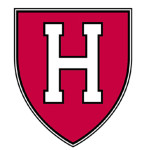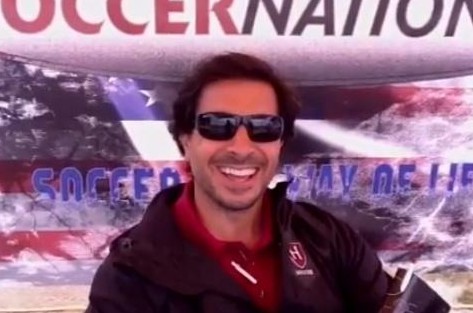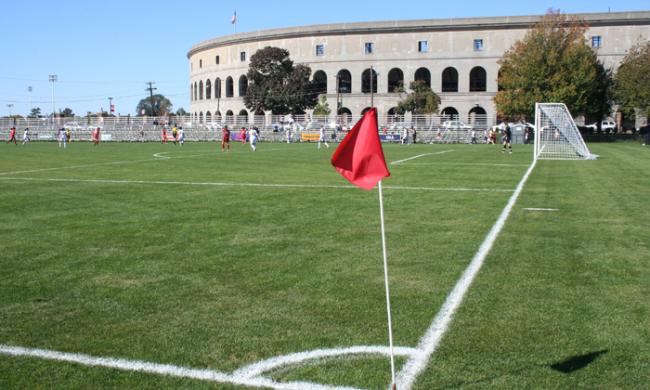What Does Harvard Look For in a Soccer Player?
Exclusive Series on What College Coaches Want. Applying to colleges and trying to get identified to play for a prestigious college or university takes time, planning and a strategy for success. SoccerToday interviewed top college coaches and asked the real questions. Every college coach said the same thing; learn everything you can about the college team you want to play for. Show you are interested and contact the coaches you want to play for.
Interview with Coach Mike Calise – Harvard Assistant Coach/Recruiting Coordinator
Mike Calise enters his seventh total season with the Crimson in 2014. Calise rejoined the women’s soccer staff as an assistant coach in March 2010 after previously serving in Cambridge during the 2005 and 2006 seasons.
 College Information: Harvard University
College Information: Harvard University
Harvard University Athletics: Harvard Crimson Athletics
Harvard at a Glance
Established in 1636
Faculty: About 2,100 faculty members and more than 10,000 academic appointments in affiliated teaching hospitals
Total Students: About 21,000
Diane Scavuzzo: How does Surf Cup compare to all of the other tournaments?
Mike Calise: Outside of the ECNL events, I’d probably put this as one of the top two events in the country.
Diane Scavuzzo: And what are you looking for today?
Mike Calise: Great soccer players. Great soccer players and great students.
Diane Scavuzzo: What does it take to get into Harvard and to play on your team?
Mike Calise: Be a great soccer player and a great student.
Diane Scavuzzo: What kind of GPA does Harvard want?
Mike Calise: I think Harvard Admission does a great job of taking into account the entire applicant, so we’re looking at 3.5 or above GPA, solid SAT scores, ACTs in the 30+ range.
Diane Scavuzzo: And when it comes to being on the field, what are you looking for?
Mike Calise: We’re looking for technically savvy players that are athletic, that enjoy playing the game and love competing. Those are the big things for us.
Diane Scavuzzo: Are you looking for goal keepers, or forwards? What positions are you scouting for?
Mike Calise: We’re looking for everything. Great players.
And for Harvard, it’s great players who are willing to play a lot of positions. That’s what we’re looking for, versatile kids. Maybe as a freshman you’re not the best center-midfielder, but if you’re willing to play somewhere else then maybe by your junior year that changes. Quality players.
Diane Scavuzzo: And how would you describe yourself as a coach?
Mike Calise: I think I’m a players’ coach. I like to think that players enjoy working and training with me. I take this as a good sign that what I’m presenting to them, they enjoy and they like the training sessions.
 Diane Scavuzzo: And what kind of soccer does your team play? How would you describe your style.
Diane Scavuzzo: And what kind of soccer does your team play? How would you describe your style.
Mike Calise: We keep the ball. We try to play soccer that I find attractive as a coach and that’s what I like to play, so that’s how our team does it.
Diane Scavuzzo: What’s your favorite team in the world?
Mike Calise: I’m an Italian guy. I’m more of an AC Milan fan, myself.
Diane Scavuzzo: When it comes to players, how important is team bonding?
Mike Calise: It’s important, especially on the female side. I think it’s very important with the kids we bring in that our team have a chance to meet them and that they’re a good fit for our program. And obviously, as coaches, it’s important they’re a good fit for us; because if you’re going to spend four years with them you’d better be a good fit for each other. It’s definitely something we don’t discount. We take that heavily into account when we’re deciding on kids.
Diane Scavuzzo: If someone would like to contact you, what should they do?
Mike Calise: I think the best way to do it is reach out with email. You’ve got to be somewhat proactive and stay on top of things. You have to imagine, too, that we’re getting emails and phone calls from players all over the country. Hundreds and hundreds of them each week. So it’s important to stay on top of us.
Diane Scavuzzo: So if people want to contact you, they can do it by email?
Mike Calise: Certainly.
Diane Scavuzzo: How does a player stand out, with so many emails coming in?
Mike Calise: It’s tough. The best thing you can do is you give the pertinent information; let us know your graduation year, what club you play on and the tournaments you’re going to be playing in. The hope is that we’re going to get to see you playing at a tournament, then the recruiting process kind of starts once we get to see you play.
Diane Scavuzzo: Does a video help?
Mike Calise: Video does help. We’re a staff that definitely looks at video. We’re all looking for that diamond in the rough that no one knows about. Some coaches don’t like video. Me, personally, I look at every video that comes in. It might not be for the entire video, but you look at it enough to figure out whether it’s a kid that might be in the mix for you.
Diane Scavuzzo: What role does the youth soccer club play in trying to find their players a great spot on the Harvard squad?
Mike Calise: It’s important nowadays, because the youth soccer clubs facilitate training sessions and with the recruiting process starting earlier and earlier, the clubs are the ones that also facilitate the contacts. You have to reach out to the club coaches, and they in turn get the kids to call us, and that’s how it all starts.
Diane Scavuzzo: How early do you look at players? At what age?
Mike Calise: We’re probably not as early as everybody, but we’re definitely keeping our eyes out for kids when they’re freshmen, sophomores for sure. And the way it is now, by the end of their sophomore year they’re starting to make decisions already, which is insane. But with the Ivy League it’s a little different because we need SAT scores, but at least we can get the ball rolling with our interest.
Diane Scavuzzo: Do you think it’s easier to identify girl players earlier on than boy players because of developmental differences?
Mike Calise: Not necessarily. I think it’s probably the same for both. They’re both going to develop well after you commit them. That’s the way things go. They’re only going to be freshman or sophomores when you’re really looking at them, so a lot of growing happens.
Diane Scavuzzo: Have you ever made a decision you regretted?
Mike Calise: I think every coach has players that maybe don’t pan out the way they thought they were going to. But also they probably have players they didn’t think would be as good that turned out better than they were. So it’s just part of the process. If you can find a perfect coach with that, let me know. I’d like to pick his brain.
Diane Scavuzzo: Where are you from? Where did you go to college?
Mike Calise: My family is East Coast – New Jersey, New York – but we grew up in St. Louis and then moved back east. So a little bit of both. I went/played at Boston College.
Diane Scavuzzo: So do you think hiring one of those packaging companies helps?
Mike Calise: I don’t think it’s necessary, to be honest with you. I think it’s a lot of money. It may help in some respects, but the bottom line is, if the college coach doesn’t know the person giving the evaluation, it doesn’t necessarily carry a lot of weight. So you’re spending all this money, and at the end of the day – even with the videos – I don’t need a $2000 video. Mom and dad with a video camera will give me enough of what I need to see.
Diane Scavuzzo: How often do you look at a player before you feel like they’re the right one?
Mike Calise: It really depends. You can look at a player a couple of minutes and decide whether they’re athletic enough. If that’s the case, you may not look at them again. But if the player’s kind of on the fence athletically and soccer-wise, you may look three or four times at least before you make a decision.
Diane Scavuzzo: And do you think being part of the U.S. Development Academy Program gives you an edge when it comes to being identified for a possible spot at Harvard? Do you look more seriously at those players than you would (at someone else)?
Mike Calise: Not necessarily. I think a good player is a good player, and there’s a lot of reasons kids do or don’t play in the National Team system or the ODP system. So for us, we don’t get too caught up in it. We’ve had a lot of great players who didn’t do anything. We had a kid at Arizona State who never played ODP. Her first experience was U21 National Team, and she started at left back in the World Cup. I think she did well for not having played in it.
Related Articles: A Soccer Player’s Guide to – Auburn University; Dartmouth College; Western Washington University; Academy of Art University






